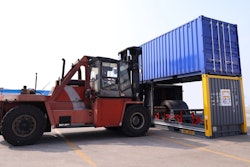
dell - stock.adobe.com
The global cold chain logistics market is set to be worth $1,245.2 billion by 2033 at a 14.5% CAGR, according to research released by Custom Market Insights.
According to the latest research study, the demand of global cold chain logistics market size and share was valued at approximately $321.5 billion in 2023, is expected to reach $368.1 billion in 2024 and is expected to reach a value of around $1,245.2 billion by 2033, at a compound annual growth rate (CAGR) of about 14.5% during the forecast period 2024-2033.
Key takeaways:
- Expanding global food trade. The increasing demand for perishable food products, coupled with globalization and changing consumer preferences, is driving the growth of the cold chain logistics market. Growing international trade in fresh produce and seafood necessitates efficient cold chain infrastructure to maintain product quality and safety during transportation.
- Rising demand for pharmaceuticals. The pharmaceutical industry’s growing emphasis on temperature-sensitive products, such as vaccines, biologics, and specialty drugs, is fueling the demand for cold chain logistics services. Strict regulatory requirements and the need to maintain product efficacy and safety during storage and distribution are driving pharmaceutical companies to invest in robust cold chain infrastructure.
- E-commerce and online grocery retailing. The proliferation of e-commerce platforms and online grocery retailing is driving the demand for cold chain logistics services. Consumers increasingly prefer to purchase fresh and frozen food items online, requiring reliable temperature-controlled transportation and storage solutions to ensure product quality and freshness upon delivery.
- Technological advancements. Technological innovations, such as Internet of Things (IoT)-enabled temperature monitoring devices, blockchain-based traceability solutions, and advanced refrigeration systems, are transforming the cold chain logistics industry. These technologies enhance visibility, transparency, and real-time tracking capabilities, enabling more efficient cold chain management and reducing the risk of product spoilage or loss.
- Stringent regulatory requirements. Stringent regulations and quality standards imposed by regulatory authorities, particularly in the food and pharmaceutical sectors, are driving the adoption of cold chain logistics services. Compliance with regulations such as the Food Safety Modernization Act (FSMA) in the United States and Good Distribution Practice (GDP) guidelines in the pharmaceutical industry is essential for market participants to ensure product integrity and regulatory compliance.
- Emerging markets and urbanization. Rapid urbanization and changing dietary preferences in emerging markets are creating significant opportunities for the cold chain logistics market. Rising disposable incomes, urbanization trends, and an increasing preference for convenience foods drive the demand for cold chain services to transport perishable goods from production hubs to urban centers efficiently.
















